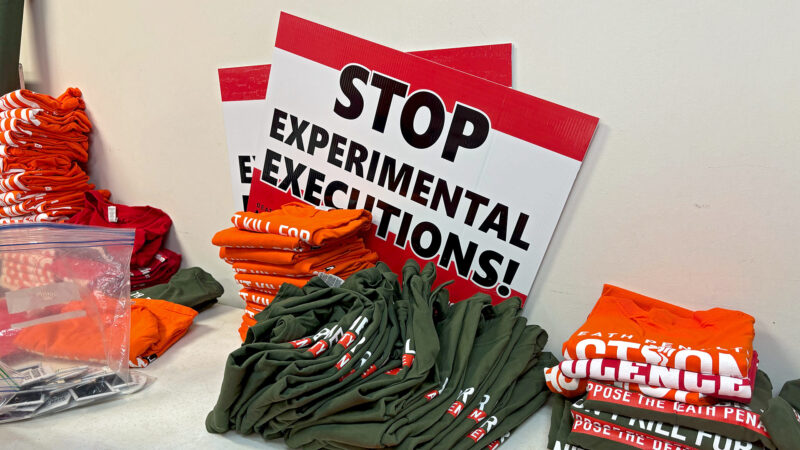Ahead of Kenneth Smith’s execution, people impacted by Alabama’s death penalty speak out
Signs and t-shirts handed out by Death Penalty Action sit on a table inside the Unitarian Universalist Church in Birmingham, Alabama, on Wednesday, Jan. 24, 2024. The nonprofit organization held an event in protest of the scheduled execution of Kenneth Eugene Smith on Thursday, featuring guest speakers impacted by Alabama Death Row.
Protestors have rallied throughout Alabama in advance of the state’s plans to execute a convicted murderer using an untested method. The night before the scheduled execution of Kenneth Eugene Smith, the Unitarian Universalist Church in Birmingham opened its doors to Death Penalty Action, a nonprofit that works to stop executions and abolish the death penalty.
The group handed out yard signs, t-shirts and buttons with messages opposing the death penalty to the dozen people gathered in the church basement to hear directly from people who have been affected by the death penalty.
“Every time something like this happens and it gets a lot of attention, more people come to the realization that the death penalty is a failed public policy,” said Abraham Bonowitz, Death Penalty Action’s executive director. “It doesn’t serve us well and we can be safe from dangerous offenders and hold them accountable without executions.”
Chris Brown attended to speak on the impact death row has on family members. His father sat on death row in Alabama for almost 17 years before he was executed in 2003.
“I grew up with him on death row and after his execution, I stayed as active as I could in the movement,” Brown said. He now works with Death Penalty Action to spread the message that the death penalty is barbaric — especially with this method.
Alabama will be the first state in the United States to use nitrogen hypoxia — using a gas mask to replace air with nitrogen and cause suffocation — in an execution. Mississippi and Oklahoma have also approved its use for future executions.
Alabama officials have called it “painless” and “humane,” but some doctors and critics have concerns.
“For me, as a Christian,” Brown said, “I believe that all life is precious and I believe that any execution is wrong.”
Smith, who has been on death row for nearly 28 years for the murder of a woman in 1988, is scheduled to be executed after 6 p.m. on Thursday. So far, courts have denied appeals to halt the execution.
Gary Drinkard, a former Alabama Death Row inmate whose conviction was overturned on appeal in 2001, attended the rally and spoke about his relationship with Smith.
“I met Kenny when I was on death row,” he said. “He would help anyone he could. He was a born-again Christian.”
Drinkard also described the emotional toll an execution would take on other incarcerated people on death row. Those still incarcerated would wear all white in honor of the person being executed on the day before and the day after their execution.
He also recalled how prisoners would bang on their cells during an execution to let the executed person know they were thinking of them in their last moments. The sound of that clanging, he said, still lingers in his nightmares.
The state previously attempted execution by lethal injection in 2022, but it was called off after workers were unable to insert the needles used for the injection into his veins.
“To expect them to be able to be competent in carrying out an execution is just absolutely foolish,” Brown said.
Gulf States Newsroom Managing Editor Priska Neely contributed to this report.
This story was produced by the Gulf States Newsroom, a collaboration between Mississippi Public Broadcasting, WBHM in Alabama, WWNO and WRKF in Louisiana and NPR.
40 years after ‘Purple Rain,’ Prince’s band remembers how the movie came together
Before social media, the film Purple Rain gave audiences a peak into Prince’s musical life. Band members say the true genesis of the title song was much less combative than the version presented in the film.
Park Fire in California could continue growing exponentially, Cal Fire officer says
Cal Fire has confirmed that over a hundred structures have been damaged in the Park Fire, which grew overnight near Chico, Calif. Difficult firefighting conditions are forecast through Friday night.
Checking in with Black voters in Georgia about the election, now that Biden is out
Some voters who could be key to deciding who wins Georgia. What do they think about Vice President Harris becoming the frontrunner in the race to be the Democratic nominee?
Tahiti’s waves are a matter of ‘life and death’ for surfing Olympics
Tahiti's Teahupo'o wave has a slew of riders for the Paris 2024 Olympics. NPR finds out why it's called one of the most dangerous waves.
Researchers are revising botanical names to address troubling connotations
Since the mid-1700s, researchers have classified life with scientific names. But some of them have problematic histories and connotations. The botanical community is trying to tackle this issue.
A spectacular opening ceremony wowed a global audience despite Paris’ on-and-off rain
The Paris Olympics opening ceremony wowed Parisians, fans and most everyone who was able to catch a glimpse of thousands of athletes floating down the Seine to officially begin the Games.



